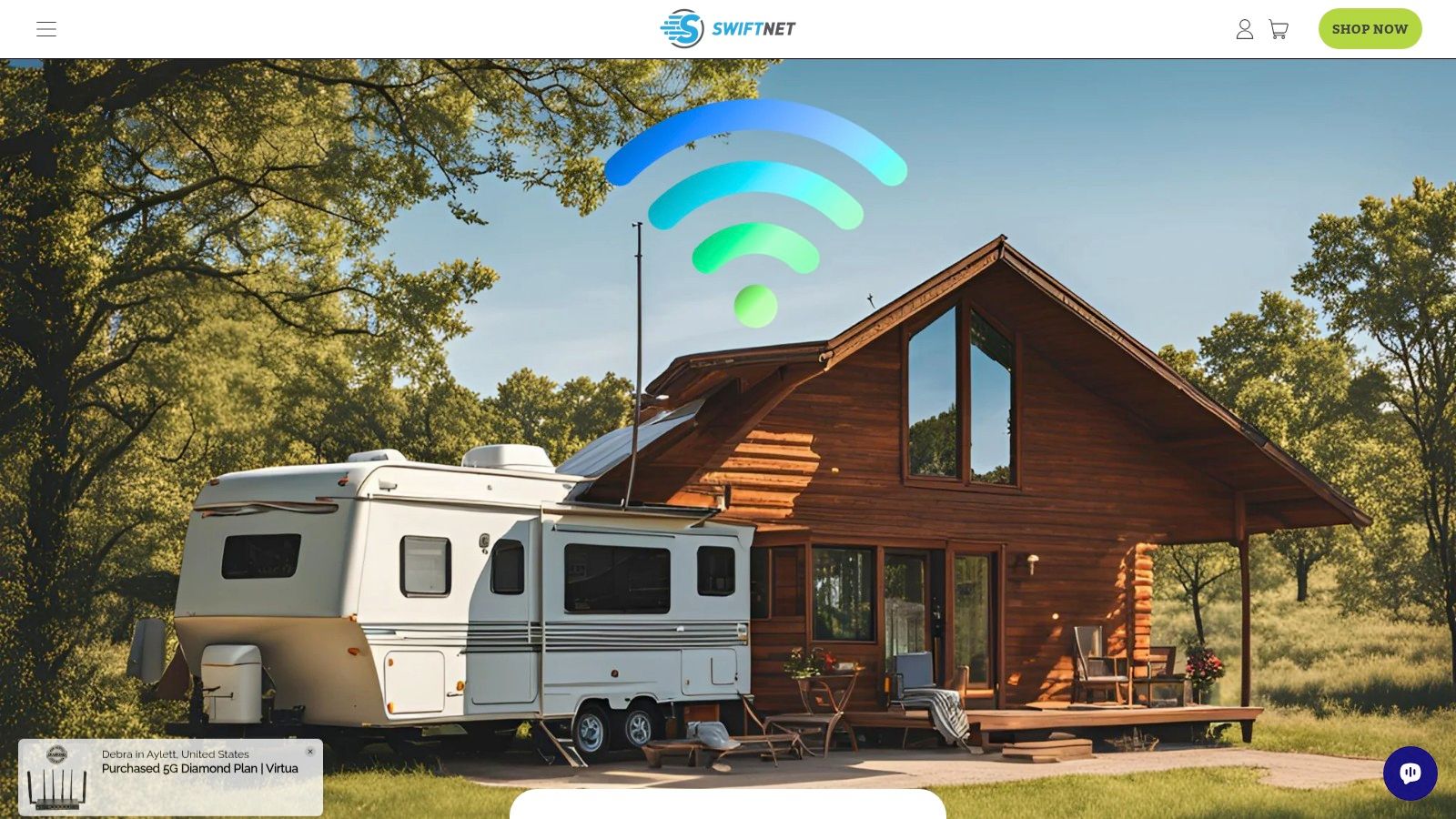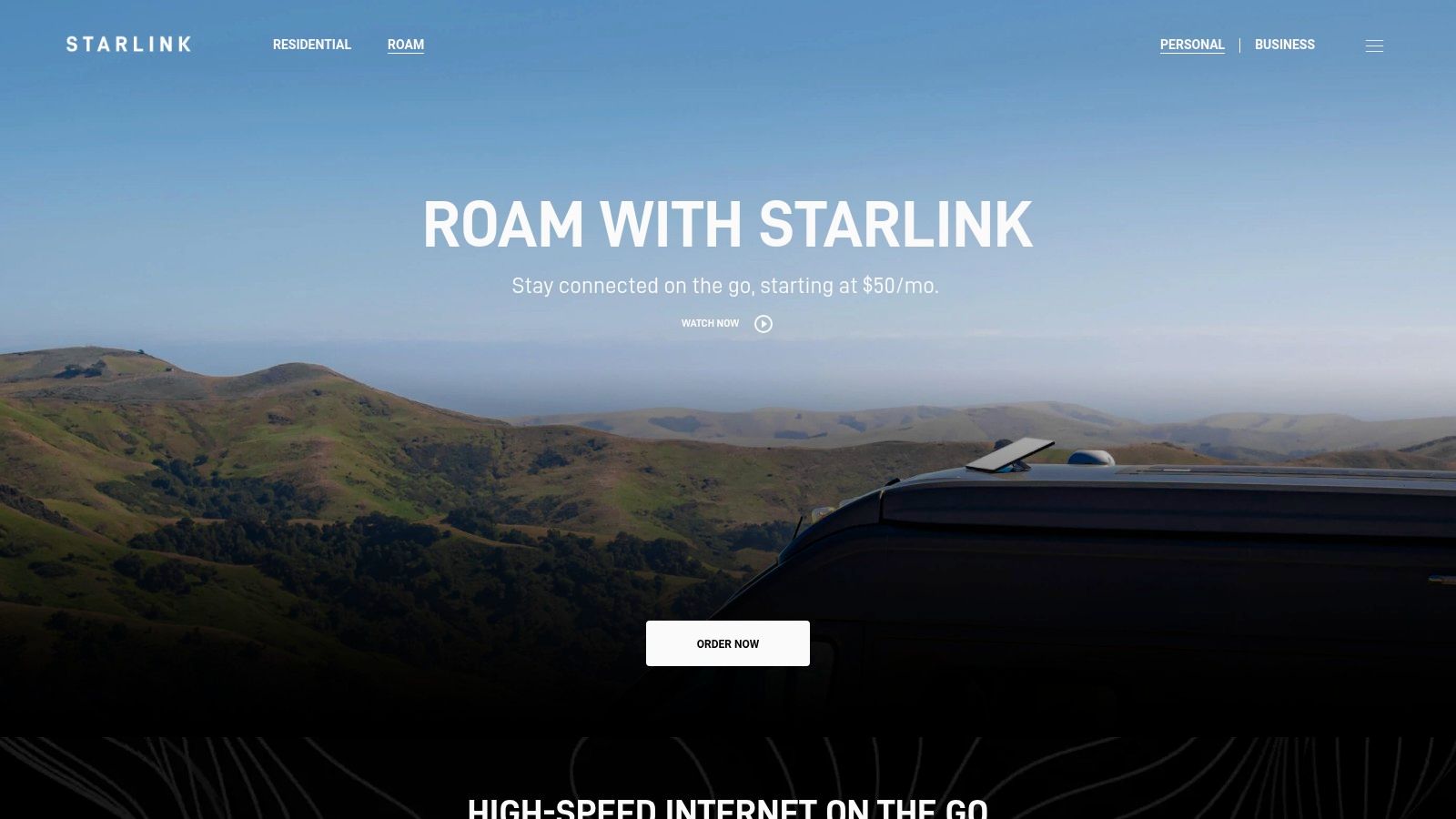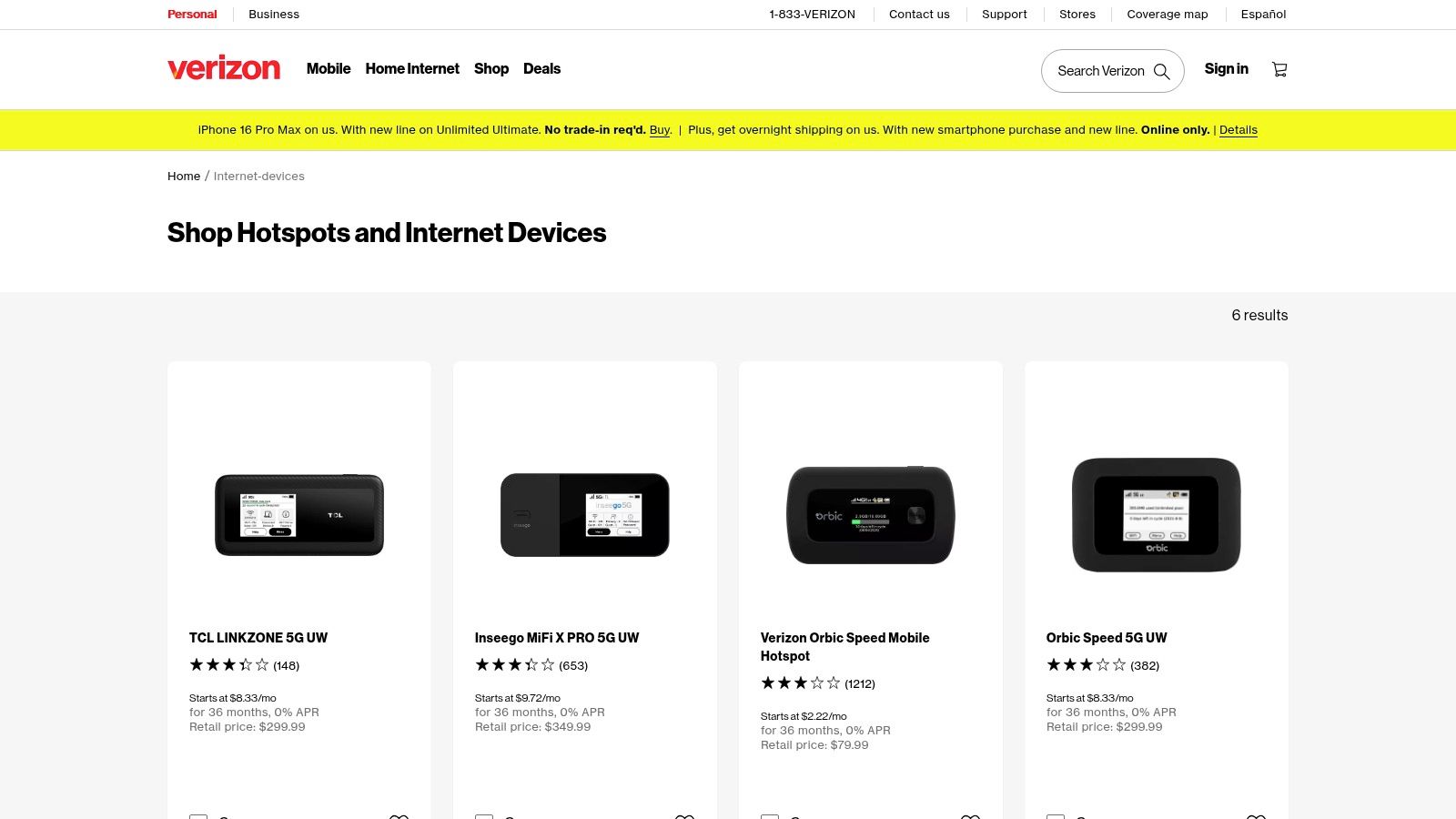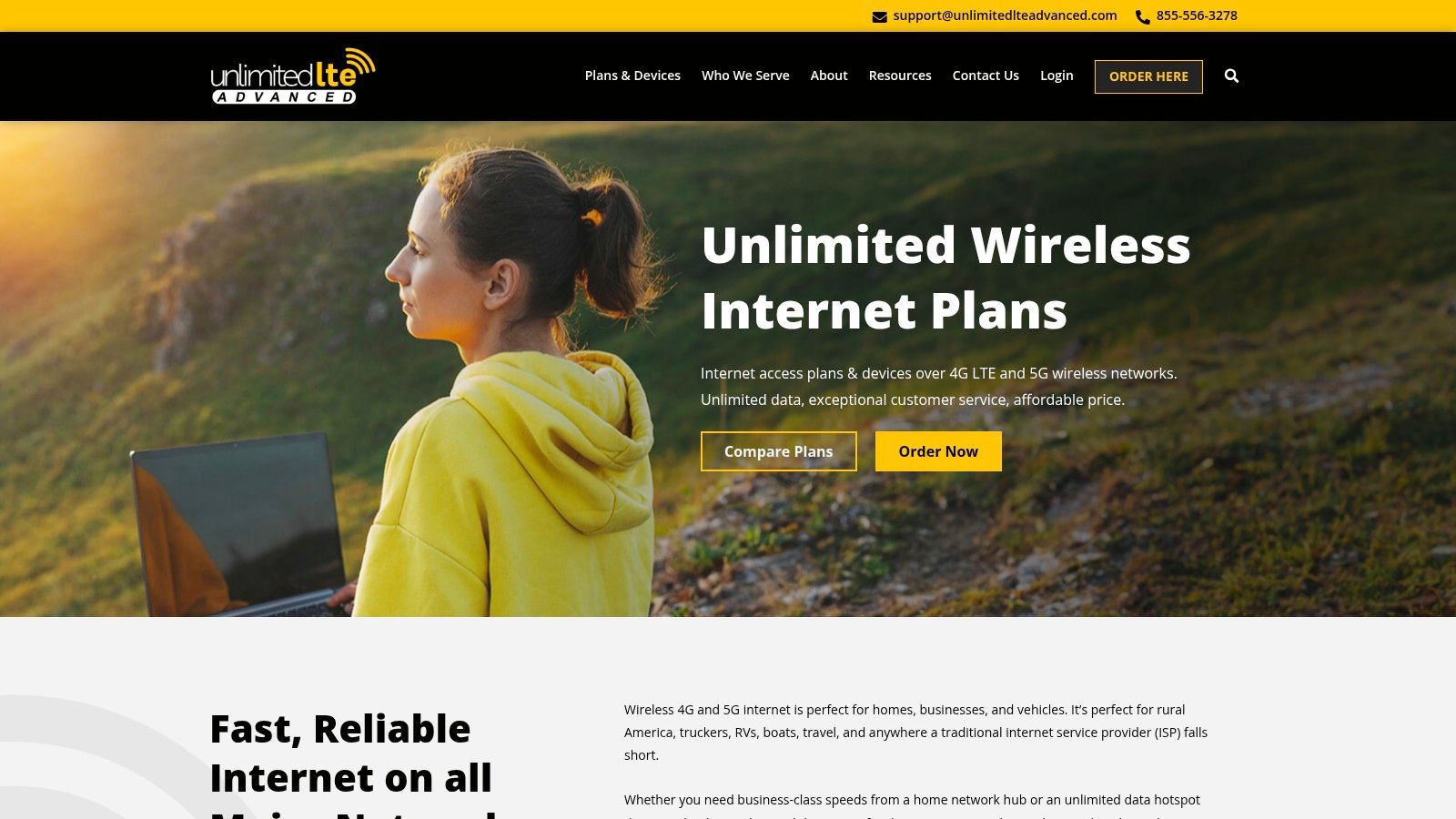
Best Internet for RV Living: Top RV Connectivity Options
Posted by James on
Hitting the Open Road, Staying Connected
Finding reliable internet for RV living can be a challenge. This listicle presents eight solutions for staying connected on the road, covering options like SwiftNet Wifi, Starlink RV, and mobile hotspots from various providers. We'll explore the pros and cons of each, helping you choose the best internet for RV living, whether you need it for remote work, streaming, or simply staying in touch. Discover which option best suits your needs and keeps you connected wherever your travels take you.
1. SwiftNet Wifi
SwiftNet Wifi offers a compelling solution for those seeking reliable high-speed internet access while embracing the RV lifestyle, especially in rural areas often underserved by traditional providers. This 5G internet service is designed specifically for mobility, making it a strong contender for the best internet for RV living. Unlike satellite internet which can be hampered by latency and weather conditions, SwiftNet Wifi utilizes the expanding 5G network to deliver faster speeds and a more consistent connection. This makes it ideal for streaming movies, conducting video calls, and even working remotely from your RV. For those living in rural areas without fiber optic internet, or anyone who travels and works online remotely, SwiftNet Wifi offers the potential for a consistent and powerful connection on the go.

SwiftNet Wifi's focus on RV travelers and rural residents is a key differentiator. While other mobile internet providers exist, many don't specifically cater to these demographics. This dedicated focus allows SwiftNet to fine-tune its services and prioritize the needs of its target audience. Information on specific data plans, pricing, and technical requirements are available on their website. While comparing SwiftNet directly with competitors isn't possible without specific data from those competitors, the emphasis on 5G coverage in underserved areas positions SwiftNet as a valuable option for reliable connectivity where other solutions may fall short.
Setup and implementation details are likely available on the SwiftNet Wifi website. Typically, this involves acquiring a 5G modem/router compatible with their network, activating a data plan, and setting up the device in your RV. The advantage of a 5G solution is the potential for plug-and-play simplicity – minimizing complicated installations and maximizing convenience.
SwiftNet Wifi earns its place on this list due to its targeted approach to providing reliable internet access for RV living and rural connectivity. The promise of high-speed 5G service, especially in areas often overlooked by traditional broadband providers, makes it a promising solution for staying connected while enjoying the freedom of the open road or the tranquility of rural living. For further details on plans and availability, visit the SwiftNet Wifi website: https://swiftnetwifi.com
2. Starlink RV (Roam)
For RVers seeking the best internet for RV living, Starlink RV (recently renamed Starlink Roam) stands out as a revolutionary option. This satellite internet service from SpaceX delivers high-speed, low-latency internet access almost anywhere you can see the sky, making it a game-changer for those who prioritize connectivity on the road. Unlike traditional internet options that rely on fixed infrastructure, Starlink RV utilizes a portable satellite dish, easily set up at each new location, providing consistent internet access regardless of your surroundings. This makes it a particularly attractive option for those who frequently change locations or travel to remote areas with limited or no cellular service. This ability to stay connected regardless of location is key for many RV travelers, especially those who work remotely or rely on the internet for entertainment and communication.

Starlink RV offers download speeds between 40-220 Mbps, with average user speeds around 100 Mbps, and latency as low as 20ms in many areas. This performance rivals, and often surpasses, traditional wired connections, allowing you to stream movies, participate in video conferences, and work online seamlessly from your RV. The "no data caps" policy with Priority access ensures consistent performance even during peak usage times. This contrasts with some other mobile internet solutions that throttle speeds or charge extra fees after a certain data limit is reached.
One of the key advantages of Starlink RV is its flexibility. The service can be paused during months when you're not traveling, saving you money during periods of inactivity. This pay-as-you-go flexibility is a huge benefit for RV owners who don't travel year-round. There are no contracts to lock you in, giving you complete control over your internet service. Additionally, a Global Roaming option is available for international travel, expanding your connectivity options beyond regional borders.
Technical Requirements and Setup: Starlink RV requires a clear view of the sky for optimal performance. The self-pointing dish makes setup relatively simple, but obstructions like trees and buildings can impact connectivity. The dish needs to be powered, which can be a consideration for boondockers relying on solar or battery power.
Pricing: The Starlink RV hardware kit costs $599, and the monthly service fee is $150 for regional coverage and $200 for global coverage. While the upfront cost is higher than some other mobile internet options, the consistent high speeds and broad coverage make it a worthwhile investment for many RV travelers.
Pros:
- Works in remote locations beyond the reach of cellular service.
- No contracts and the ability to pause service monthly.
- Consistent high speeds regardless of location.
- Independent of local infrastructure.
- Global coverage option available.
Cons:
- Higher upfront equipment cost ($599).
- Monthly service fee of $150 (regional) or $200 (global).
- Requires a clear view of the sky and setup at each location.
- Power consumption (can be a challenge for boondocking).
Website: https://www.starlink.com/roam
Starlink RV offers a compelling solution for the best internet for RV living, providing a reliable and high-performance connection wherever your travels take you. Its unique ability to deliver consistent internet access in remote areas, coupled with the flexibility to pause service and the option for global coverage, makes it a strong contender for RVers seeking a superior internet experience on the road.
3. Verizon Mobile Hotspot
For RVers seeking reliable internet access across the US, a Verizon mobile hotspot is a strong contender for the best internet for RV living. Verizon boasts extensive 4G LTE and 5G network coverage, providing dependable connectivity in most populated areas and along major travel routes, making it a practical solution for staying connected on the road. With a dedicated hotspot device like a Jetpack or MiFi, you can easily create a Wi-Fi network within your RV, enabling multiple devices to connect simultaneously. This is essential for travelers who work remotely, stream entertainment, or need to stay in touch with family and friends. This plug-and-play solution requires minimal technical knowledge, making it ideal for those who want a hassle-free internet setup.

Verizon offers a range of mobile hotspot plans to accommodate various data needs and budgets, typically from 15GB to unlimited options. This flexibility allows you to choose a plan that aligns with your usage patterns. The ability to use the hotspot while driving is another significant advantage for RVers, ensuring continuous connectivity even when on the move. Especially for those traveling in rural areas of the US, Verizon often offers the best overall cellular coverage, a crucial factor for consistent internet access. While some competitors may offer seemingly attractive plans, their coverage in less populated areas often falls short, leading to frustrating connectivity issues.
Verizon's 5G Ultra Wideband access, where available, provides even faster speeds, further enhancing the internet experience for demanding tasks like video conferencing or large file downloads. The setup is as simple as activating the device; no complicated installation or technical expertise is needed.
Pros:
- Best overall cellular coverage in rural areas of the US: A critical factor for reliable internet access while RVing.
- Plug-and-play solution: Easy setup and minimal technical knowledge required.
- Can be used while driving/in motion: Maintain connectivity throughout your journey.
- Various data plans to fit different needs and budgets: Flexibility to choose the right plan for you.
Cons:
- More expensive monthly plans compared to other carriers: The premium coverage comes at a cost.
- Data throttling on unlimited plans after priority data is used: Speeds may decrease after a certain data threshold.
- Coverage still limited in very remote locations: Even Verizon's extensive network has limitations.
- International coverage requires additional fees: Consider additional costs if traveling abroad.
While Verizon plans may be more expensive than some competitors, the superior coverage, especially in rural areas crucial for many RVers, often justifies the price. For reliable internet access on the go, Verizon remains a top choice. You can explore their various plans and devices on their website: https://www.verizon.com/internet-devices/
4. T-Mobile Home Internet for RVs
Finding the best internet for RV living can be a challenge, but T-Mobile Home Internet has emerged as a popular and affordable contender. While technically designed for stationary homes, its attractive price point, unlimited data, and increasing coverage make it a viable option for many RV travelers seeking reliable connectivity on the road. This solution deserves a spot on our list because it offers a compelling balance of cost and performance, particularly for those primarily traveling within the US. Learn more about T-Mobile Home Internet for RVs.
For a flat $50/month with autopay, you get truly unlimited data with no throttling or priority data limits, a rarity in the mobile internet world. This contrasts sharply with some competitors who advertise "unlimited" plans but then throttle speeds after a certain data threshold. This makes T-Mobile Home Internet particularly appealing for those working remotely from their RV, streaming movies, or engaging in other data-intensive activities. The simple plug-and-play gateway device further simplifies the setup process, requiring no complicated installations or additional equipment beyond the provided gateway.
T-Mobile's service utilizes both their expanding 5G and reliable 4G LTE networks. While 5G availability continues to grow, the solid foundation of 4G LTE provides a dependable backup, ensuring a more consistent connection than relying solely on a nascent 5G network. This is especially valuable for RV travelers who venture outside of major urban areas. T-Mobile has been actively investing in expanding their rural coverage, making this option increasingly attractive for RVers who prefer exploring less populated destinations.
Practical Applications and Use Cases:
- Work From Anywhere: The unlimited data allows for seamless video conferencing, file uploads, and other work-related tasks without worrying about data caps.
- Entertainment on the Go: Stream movies, music, and online games without interruption thanks to the unlimited data and no throttling policy.
- Staying Connected with Family and Friends: Easily keep in touch through video calls, social media, and email.
- Navigation and Trip Planning: Access real-time traffic information, maps, and points of interest for a smoother travel experience.
Technical Requirements and Setup:
The T-Mobile Home Internet gateway requires a standard AC power outlet. This means it won't work when boondocking (dry camping without hookups) unless you have an inverter and sufficient battery power. The setup is straightforward; simply plug in the gateway and follow the on-screen instructions.
Pros:
- Very affordable at $50/month for truly unlimited data.
- True unlimited data with no throttling or priority data caps.
- Easy setup with a simple plug-and-play gateway.
- Growing coverage map with a strong presence in urban and suburban areas.
Cons:
- Officially not designed for mobile use in RVs, although many users report success. While many RVers report using it successfully on the road, it is against T-Mobile's Terms of Service, so there is a risk of service interruption. For a solution specifically designed for RV use, and with consistent, reliable support, consider SwiftNet.
- Coverage can be spotty in remote areas compared to Verizon.
- Requires AC power, limiting use while boondocking.
- May experience network congestion in popular areas.
Website: https://www.t-mobile.com/home-internet
While T-Mobile Home Internet offers a tempting solution for RV internet, its limitations regarding official mobile use and power requirements should be considered. Weighing these factors against your specific needs and travel style will help you determine if it's the right fit for your RV lifestyle.
5. Nomad Internet
Nomad Internet caters specifically to the needs of RVers, rural residents, and travelers seeking reliable internet access on the go. They understand the unique challenges of maintaining a consistent connection while moving between locations, and offer a variety of plans to address those challenges. Their service leverages multiple carrier networks (AT&T, T-Mobile, and Verizon), allowing you to choose the network with the best coverage in your travel area—a crucial feature for anyone seeking the best internet for RV living. This flexibility lets you optimize your connection based on your current location, rather than being stuck with a single carrier that might have spotty coverage in certain areas. They also pride themselves on offering truly unlimited data plans with no throttling on most plans, eliminating the worry of data caps or slowed speeds mid-trip.

Nomad Internet provides preconfigured routers, simplifying setup and ensuring you can connect quickly upon arrival at your destination. This plug-and-play approach is a major advantage for those who aren't tech-savvy and prefer a hassle-free experience. They also offer specialized customer support geared towards mobile internet users. This expertise can be invaluable when troubleshooting connection issues or seeking advice on the best plan for your specific travel needs. While some providers offer generic customer service, Nomad Internet’s focus on mobile connectivity makes them better equipped to address the specific challenges faced by RVers and other mobile internet users. For more information, learn more about Nomad Internet.
One of the key benefits of Nomad Internet is its focus on mobility. Their service is designed from the ground up to support a mobile lifestyle, unlike some residential internet providers that may have limitations on usage in moving vehicles. This makes Nomad Internet a popular choice within the RV community and a solid contender for those seeking the best internet for RV living.
Nomad Internet offers various plans ranging from $129 to $149 per month, depending on the chosen carrier and features. You'll also need to purchase a router, which costs between $249 and $599 depending on the model. While the upfront and monthly costs are higher than some direct carrier plans, the convenience, specialized support, and focus on mobility provide significant value for many RVers.
Pros:
- Designed specifically for RVers and mobile users
- Flexible plan options across different carrier networks
- No contracts with month-to-month service options
- Knowledgeable customer service about mobile internet needs
Cons:
- Higher monthly costs than direct carrier plans ($129-$149/month)
- Router purchase required ($249-$599 depending on model)
- Some users report inconsistent speeds during peak usage times
- Reseller of major carrier services, not a direct provider
While Nomad Internet provides a valuable service for the RV community, it's essential to compare it with other options to find the best fit for your individual needs. Factors like budget, data usage, and technical expertise will play a role in determining the ideal solution for your specific situation. Keep in mind that providers like SwiftNet are constantly working to improve their offerings and provide competitive advantages in areas like customer service, equipment options, and pricing. It's always a good idea to research and compare different providers before making a decision.
6. AT&T Mobile Hotspot
Finding the best internet for RV living can be a challenge, but AT&T's mobile hotspot solution is a strong contender for many travelers. Offering a balance of coverage and speed, particularly in urban and suburban locations across the US, AT&T can provide a reliable internet connection for your RV adventures. This makes it a worthwhile option for those seeking consistent connectivity, especially in popular tourist destinations and along the East Coast.
AT&T offers dedicated hotspot devices, like the Nighthawk, which create a private Wi-Fi network within your RV. This means you can connect multiple devices, from laptops and tablets to smart TVs and gaming consoles, all within the comfort of your mobile home. This dedicated setup provides a more secure and stable connection compared to tethering from your phone, which can drain battery life quickly.
For those prioritizing the best internet for RV living, having a variety of data plans is crucial. AT&T delivers on this front, with options ranging from limited data for casual users to higher-capacity plans for those who work remotely or stream frequently. The availability of prepaid plans is a significant advantage for seasonal travelers, providing flexibility and avoiding lengthy contracts. This allows you to tailor your internet usage to your specific travel patterns and budget.
Features:
- Strong urban and suburban coverage across the US
- Dedicated hotspot devices available (e.g., Nighthawk)
- Multiple data plan options, including prepaid plans
- Ability to use existing AT&T phone plans with hotspot capabilities
Pros:
- Good coverage in many national parks and tourist destinations
- Generally stronger east coast coverage than some competitors
- Flexible prepaid options ideal for seasonal travelers
- Often less network congestion than T-Mobile, providing more consistent speeds.
Cons:
- Rural coverage might not be as extensive as some other providers in certain western areas.
- Higher-capacity plans can be expensive. Be sure to evaluate your data needs and budget accordingly.
- Data deprioritization can occur during periods of network congestion, potentially leading to slower speeds.
- Dedicated hotspot devices require an upfront equipment cost.
Website: https://www.att.com/internet/fixed-wireless/
Why AT&T Deserves a Spot on this List:
AT&T's combination of coverage, device options, and flexible plans makes it a viable internet solution for many RV lifestyles. While other providers may boast wider coverage in specific areas, AT&T's focus on popular travel destinations and generally strong eastern US presence caters to a substantial portion of the RV community. The availability of prepaid plans allows for better budget control, a significant factor for seasonal travelers. While considering the best internet for RV living, weighing coverage in your anticipated travel areas is key, and AT&T’s strengths in urban, suburban, and popular tourist locations makes them a worthwhile consideration.
Implementation Tips:
- Check coverage: Before committing to a plan, use AT&T's coverage map to verify the signal strength in your planned travel routes.
- Consider data needs: Carefully evaluate your internet usage habits to choose a data plan that meets your requirements without overspending.
- Research device options: Compare the features and specifications of different hotspot devices to select the best fit for your needs.
By carefully considering your individual needs and researching coverage availability, AT&T’s mobile hotspot offering can be a reliable and flexible solution for enjoying internet connectivity on the road. Always compare options and prioritize the factors that matter most to your specific RV lifestyle.
7. Unlimited LTE Advanced
For RVers seeking a truly unlimited internet experience without the headaches of throttling and data caps, Unlimited LTE Advanced deserves serious consideration as one of the best internet options for RV living. This specialized provider focuses on delivering robust data plans specifically designed for the mobile lifestyle of RVers, rural homeowners, and remote workers. They understand the unique challenges of staying connected on the road and aim to provide seamless internet access wherever your travels take you.

One of the most significant advantages of Unlimited LTE Advanced is their commitment to providing truly unlimited data on most plans, meaning no throttling even after you've used a certain amount of data. This is a crucial feature for those who rely heavily on the internet for work, entertainment, or staying in touch with loved ones while on the road. They achieve this by leveraging the major cellular carrier networks, providing access to a broader range of coverage across the country. The company offers pre-configured routers designed specifically for mobile use, simplifying the setup process dramatically. These routers arrive ready to work with their SIM cards, minimizing technical hurdles for users less familiar with network configurations. This plug-and-play approach makes getting online quick and easy, a valuable benefit for those constantly on the move.
Unlimited LTE Advanced offers a variety of plans with varying data allowances and speeds, allowing users to select the option that best fits their needs and budget. They operate on a month-to-month basis, providing the flexibility to adapt your internet service as your travel plans change. This no-contract approach is particularly beneficial for RVers who may not want to be tied down to a long-term commitment. While some resellers might offer seemingly attractive deals, they may not offer the specialized focus on RV living and the understanding of the unique challenges that Unlimited LTE Advanced provides.
Features:
- Truly unlimited data with no throttling on most plans
- Preconfigured routers designed for mobile use
- Access to multiple carrier networks depending on plan
- No contracts with month-to-month billing options
Pros:
- Specialized for mobile and RV users' needs
- Simple setup with pre-configured equipment
- Flexible plan options across multiple networks
- Good customer service familiar with RVers' challenges
Cons:
- Higher monthly costs than direct carrier plans (however, the benefit of truly unlimited data and specialized support often outweighs the cost difference for many RVers).
- Equipment purchase required upfront (this ensures compatibility and optimal performance with their service).
- As a reseller, subject to carrier policy changes (Unlimited LTE Advanced works to mitigate the impact of these changes on their customers).
- Some users report variable speeds depending on location (cellular service quality can vary depending on location, a common challenge for all cellular-based internet providers).
Website: https://unlimitedlteadvanced.com/
Implementation Tip: Before hitting the road, contact Unlimited LTE Advanced to discuss your specific data needs and travel plans. Their customer service team can help you choose the best plan and router for your situation. They can also provide valuable insights into maximizing your connectivity while traveling. While pricing isn't publicly listed, contacting them directly allows you to tailor a plan to your needs and get a clear understanding of the associated costs. This individualized approach helps ensure you're getting the best possible service for your RV lifestyle.
8. Campground Wi-Fi with WeBoost
Finding the best internet for RV living can be a challenge, but leveraging existing infrastructure can be a clever strategy. One such approach is combining campground Wi-Fi with a WeBoost signal booster. This combination offers a potentially cost-effective solution for staying connected while enjoying the RV lifestyle, especially for those who frequent campgrounds and RV parks. Learn more about Campground Wi-Fi with WeBoost
Many RV parks and campgrounds offer complimentary Wi-Fi, but the signal strength can often be weak or unreliable, especially at sites further away from the source. A WeBoost system works by capturing these existing weak signals and amplifying them, significantly boosting the signal strength at your RV. This can transform a barely usable connection into a robust one, enabling you to stream, work remotely, and stay connected.
Features and Benefits:
- Utilizes Existing Infrastructure: Leverages free or included Wi-Fi, potentially minimizing ongoing internet costs.
- Significant Signal Amplification: WeBoost systems boast the ability to amplify weak signals by up to 32 times, drastically improving connection quality.
- No Data Caps (on Campground Wi-Fi): Enjoy unlimited data usage when connected to campground Wi-Fi, perfect for streaming and large downloads.
- One-Time Investment: Unlike monthly internet service subscriptions, a WeBoost system is a one-time purchase, making it a cost-effective solution in the long run.
- Versatile Compatibility: Works with any available Wi-Fi signal, making it adaptable across various campgrounds and RV parks.
- Complementary Solution: Can be seamlessly combined with a minimal cellular data plan as a backup for times when campground Wi-Fi is unavailable or unreliable. This hybrid approach provides a more comprehensive internet solution for RV living.
Pros:
- Potentially low ongoing costs by primarily using free Wi-Fi.
- No data caps when connected to campground Wi-Fi.
- Works with any available Wi-Fi signal.
- One-time hardware investment avoids recurring monthly bills.
Cons:
- Reliant on campground Wi-Fi infrastructure, which can vary widely in quality and availability.
- High upfront equipment cost, typically ranging from $300 to $500 for quality WeBoost boosters.
- Not a suitable solution for boondocking or dispersed camping where external Wi-Fi is unavailable.
- Connection quality remains dependent on the original signal strength and network congestion.
Implementation and Setup Tips:
Installing a WeBoost system in your RV is relatively straightforward. It involves placing an external antenna to capture the available Wi-Fi signal, connecting it to the booster unit inside your RV, and then broadcasting the amplified signal. Refer to the manufacturer's instructions for detailed setup guidance.
Pricing and Technical Requirements:
WeBoost offers various RV signal booster models with prices ranging from $300 to $500. The technical requirements are minimal, primarily involving a 12V DC power source in your RV.
Why WeBoost Deserves a Spot on the List:
For RVers who primarily stay in campgrounds and RV parks, a WeBoost system represents a practical way to enhance the often-weak Wi-Fi signals and enjoy a more reliable internet connection. While it's not a standalone solution for all RV internet needs (especially for boondockers), its ability to leverage existing infrastructure and significantly improve connection quality makes it a valuable tool for many RV travelers. It provides a balance between cost-effectiveness and performance, making it a worthwhile consideration for those seeking the best internet for RV living. While some other companies may offer similar signal boosting technology, ensuring you choose a reputable brand like WeBoost is essential for optimal performance and reliability. Remember, having reliable connectivity while on the road is paramount, and a solid signal booster can significantly enhance your online experience. This is especially true if your travels limit your ability to access stable cellular or other internet options.
Website
8 Best RV Internet Options Comparison
| Provider | Core Features ✨ | User Experience ★ | Value Proposition 💰 | Target Audience 👥 |
|---|---|---|---|---|
| 🏆 SwiftNet Wifi | High speed 5G; tailored for rural & RV use | Reliable connection ★★★ | Dedicated service at competitive pricing 💰 | Rural residents & RV travelers 👥 |
| Starlink RV | Portable satellite dish; global roaming | Consistent speeds ★★★★ | No data caps with flexible pausing 💰 | Mobile RV adventurers 👥 |
| Verizon Mobile Hotspot | Extensive 4G/5G coverage; plug-and-play devices | Superior rural coverage ★★★★ | Varied data plans with premium reliability 💰 | US-based RVers & road travelers 👥 |
| T-Mobile Home Internet | Unlimited 5G/4G gateway; simple setup | Affordable performance ★★★ | True unlimited data with no throttling 💰 | Budget-conscious RV users 👥 |
| Nomad Internet | Multi-carrier options; preconfigured routers | Optimized mobile connectivity ★★★ | Flexible plans with specialized support 💰 | RVers & rural dwellers 👥 |
| AT&T Mobile Hotspot | Nationwide network; versatile devices | Steady coverage in urban/suburban areas ★★★ | Multiple plan options including prepaid 💰 | Urban and suburban RV users 👥 |
| Unlimited LTE Advanced | Unlimited data; preconfigured mobile routers | Easy, streamlined setup ★★★ | Specialized for mobile professionals with flexible billing 💰 | Full-time RV travelers & mobile professionals 👥 |
| Campground Wi‑Fi + WeBoost | Amplifies weak campground Wi‑Fi signals | Variable performance ★★ | Low ongoing costs with one‑time booster investment 💰 | Campground and RV park users 👥 |
Choosing Your Perfect RV Internet Connection
Finding the best internet for RV living can feel overwhelming with so many options available. This article has explored several popular choices, from mobile hotspots with providers like Verizon and AT&T, to dedicated RV internet services such as Starlink RV and Nomad Internet, and even leveraging campground Wi-Fi with boosters like WeBoost. We also examined newer solutions like T-Mobile Home Internet for RVs and, of course, SwiftNet Wifi. Each option offers a unique blend of benefits and drawbacks regarding speed, data limits, coverage, and price. Remember, some providers might offer attractive introductory deals but then lock you into long-term contracts with price hikes, a common practice that SwiftNet Wifi actively avoids.
The most important takeaways when selecting your RV internet solution are understanding your data needs, knowing your travel style, and setting a realistic budget. If you’re a light internet user and primarily stay in campgrounds, a boosted campground Wi-Fi connection or a mobile hotspot might suffice. However, for consistent, high-speed connectivity for remote work or streaming, a dedicated RV internet service becomes essential. While some competitors, like Nomad Internet, attempt to offer similar solutions, their performance often falls short, especially in terms of reliability and customer service.
Choosing the right tools hinges on these priorities. If robust, reliable performance and comprehensive coverage are your non-negotiables for a stress-free online experience, consider solutions like Starlink RV. However, be mindful of the higher equipment costs and potential obstructions impacting satellite internet. Ultimately, if you're looking for a balance of performance, affordability, and exceptional customer service, SwiftNet Wifi emerges as a leading choice for the best internet for RV living in 2025 and beyond.
Don't let unreliable internet hold you back from enjoying the freedom of the open road. Experience seamless connectivity with SwiftNet Wifi, designed specifically for the needs of RV travelers. Visit SwiftNet Wifi today to learn more and choose the perfect plan for your RV adventures.


















































